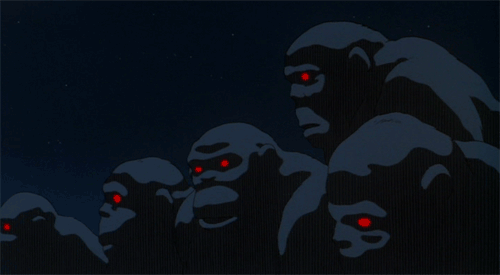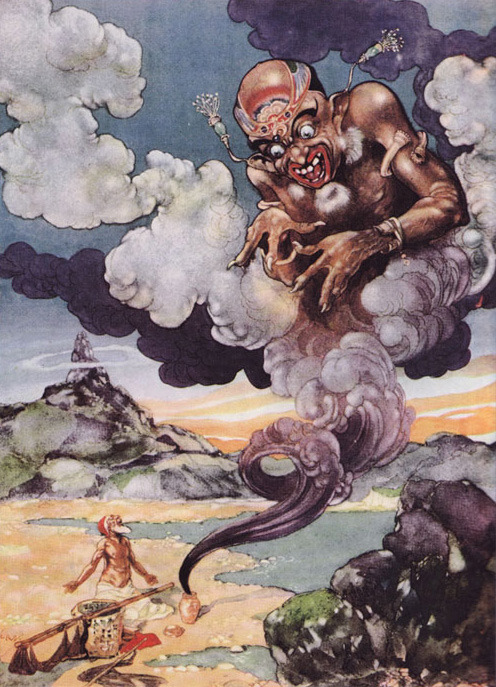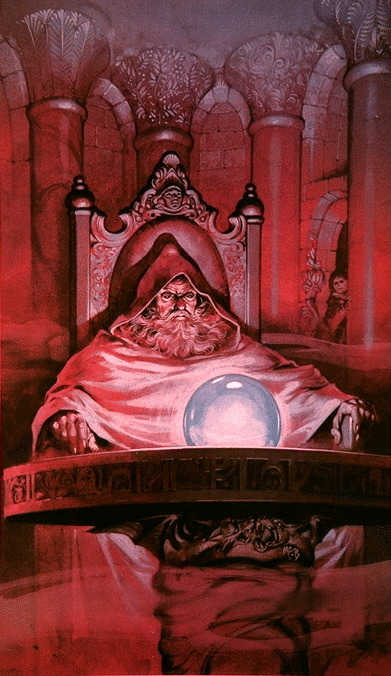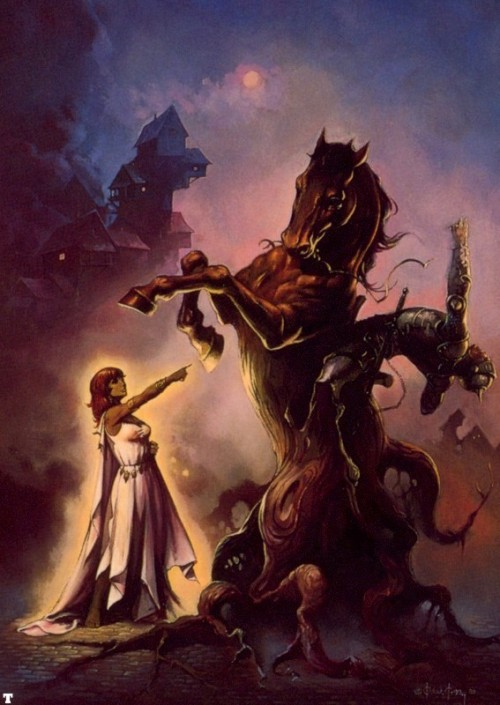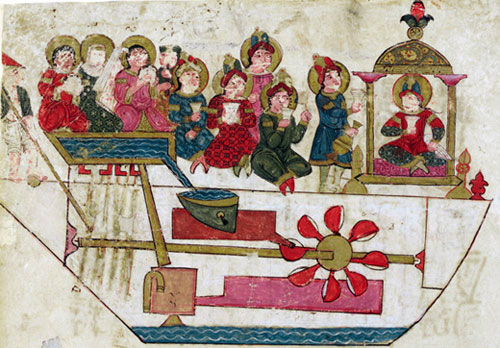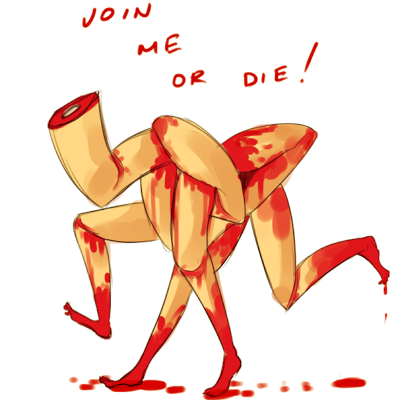The Cleric class assumes that your setting has a very specific type of god. A noble and benevolent deity that loves healing and nature, and constantly fights against corruption and evil. An ever-present, all-knowing and all-loving god. A Christian god.
I've never played a game with this kind of god. I've had savage, thoughtless gods, whimsical trickster gods, cold and absent gods, pagan pantheons holding gods of every color - never a Most High God. Growing up with Christianity everywhere, my group finds Him pretty boring. I haven't played around much, but it seems like a lot of the blog-o-sphere must feel the same way. The gods I've seen take more inspiration from Moorcock, Vance and
Lovecraft than from the bible.
People still play Clerics, of course, so I shoe-horn the Catholic stuff into my weirdo gods. My goofy
crocodile trickster god gives his clerics the power to heal, help others, and destroy the wicked, as does my
dual-aspect insect god. So does
Zak smith's Grim, Gaunt God of Iron, Rust and Rain. So does
every one of these, I assume. Maybe the evil gods get to be Catholic Satan instead.
DCC has a slightly different problem. Whenever a DCC cleric fails a spell, they incur disfavor. This disfavor builds up over time, making them more and more likely to suffer the wrath of their god - until they take a rest for the day, whereupon it resets to 0. So, along with the catholic baggage, all gods are now crazed, wrathful avengers with the memory of goldfish. They get pissed off whenever you use the spells they gave you, only to instantly forget that on the next day.
There's nothing wrong with playing a game with catholic gods - even blind, angry ones. It's just that making every god with a cleric the same is a terrible waste. So here's my alternative: A Summoner. A more pagan kind of Cleric that's in communion with all the various demons, Fairies, Loa and Jinn that span this wild world. You can use them instead of a Cleric or side-by-side.
Commanding the Spirits
Every tree, forest, ocean and mountain has it's own spirits. As a summoner, you can command them. Use the same stats as a Cleric, but gain a Summon Slot every level instead of a spell slot. This lets you make a pact with a new spirit, which you can then summon at will. (You can play out tracking down and binding of this new spirit, or just automatically gain it - DM's choice.) You roll a Command Check to order these spirits around.*
Command check: Roll d20 + your WIS modifier + half your Summoner Level.
The check is 10, +2 per level of the spirit. So you need 12 or better to command level 1 sprites, 14 for level 2, etc.
If you succeed, you can give them a single command - usually a normal action, like "Go here and do this". Once it's completed it's task the demon may disappear or sit around to watch the show, but you'll need to re-roll the Command Check every time you want to give them an order.
Whenever you fail the Command Check, you gain one Disloyalty. This adds 1 to your Critical Fail chance for Command Checks, representing the weakening of your bindings. Disloyalty builds up over time, resetting when you sleep. If you ever critically fail a command check, one of your spirits will burst free of your bonds and start causing havoc.
While free, a spirit adds their HP to the Command Check needed to bind them. You'll need to wear them down, then succeed at a Command Check to bind them again.
Healing
You can sacrifice your servants to sustain you and your companions. Roll a Command check and order your minion to let the afflicted party drink of their blood. A level 1 sprite heals as "Cure Light Wounds", level 2 blood acts as "Cure Serious Wounds", and level three is "Cure Critical Wounds". Once you do this, you won't be able to summon them for the rest of the day.
When you get up to a high enough level, you gain enough control over your minions to bind them into objects, or even dead bodies. To do this, you need to be 5 times the level of the spirit - level 5 Summoners can bind level 1 spirits, level 10 summoners can bind level 2 spirits, etc. (For DCC, it's 2X the level of the spirit.)
Patron
Arioch, Arioch! Blood and Souls for my lord Arioch!
You have one powerful Patron - your god, or a powerful demon. This spirit gave you your power, in exchange for your True Name. Your soul will go to them when you die. It's up to you whether this thought fills your days with joy or wakes you up in a cold sweat every night.
You can call on them for Divine/Infernal Intervention. Roll a Command Check. A 10 gets you the simplest request possible, 12 is useful, 18 is incredible, up to an apocalyptic 30. The power of them entering this world makes the spirits restless, and weakens all bonds; add +10 to Disloyalty when you summon them.
Spirits for the rest of the party
Everyone can ask the spirits for aid, even if they can't actually summon them. You can find, make or buy charms dedicated to Gods, Demons and Sprites, and roll a Command check once per day to ask one of them for help. For non-summoners, that's d20 + your Wisdom modifier. Like Patrons, you can make a request equal to the number you rolled - 10 for the most useless thing imaginable. What they can do depends on the spirit - a sea god could protect you from drowning, but be useless against fire.
NPC's will typically ask for good crops, help in childbirth, or protection from barnacles on the hulls of their ships. PC's will likely want something more obvious, but the effect will always be passive and invisible - a bonus to dice rolls, better AC against unholy creatures, protection from disease, that sort of thing.
You can get a bonus to your command check by making offerings to the spirit. Tropical Loas love candy and rum, fairies love music and houses of cards, Christian gods want dedicated worship and acts of goodwill. You can use this to become a kind of paladin - dedicate yourself to a god, make their sacrifices and wear their charms to get their aid with your fighting, thiefing, or magic-using.
The old gods have no power in the South... You may find that your charm's power wanes as you enter the territory of a foreign god. Suffer a -1, -2, etc to command checks for amulets as you get further in to those hostile lands.
Appendix N: Dying Earth, Elric, the Wizard-Knight books, Clandestinauts, Pokemon.














